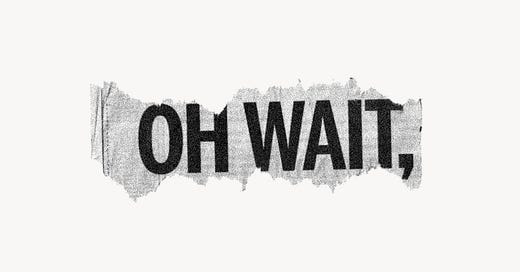They Call You Stubborn—Here's What They're Really Saying
Why your self-preservation looks like defiance to others
Over the weekend someone called me stubborn. It was something I had heard of about myself, many times over the years. But this time, it stayed with me and I felt annoyed. This short essay is the reflections that followed.
You've been carrying this label for years, haven't you? Stubborn.
It came up in childhood when you refused to eat, listen, or say hello. It followed you into adulthood when you refused to nod along with opinions that simply didn’t sit right.
There's this quiet exhaustion that comes with being told you're difficult when you're simply being yourself.
But here’s what most people won’t acknowledge:
Being stubborn is you, standing up for yourself.
Being stubborn means you are refusing to bend on your needs and your sense of safety, to please others. Why should you be forced to adapt and act in a way that makes you uncomfortable, simply to make someone at ease?
Your so-called stubbornness isn't about taking pleasure in disappointing people.
It's about protecting the part of yourself that knows what feels right and what doesn't.
🪐 If my essays help you put words onto patterns you can’t name or make you feel seen and hopeful, consider supporting this newsletter. It would make my day.🪐
What looks like defiance from the outside is actually self-preservation from the inside.
The world has taught you that compliance equals kindness.
But what if your refusal to bend isn't a character flaw—it's a sign that you love yourself enough to not back down when being intimidated?
When a child refuses to eat food they don't want, they're honouring their body's signals. When an adult refuses to change their opinion to make someone else comfortable, they're honouring their inner knowing.
This isn't for the sake of causing chaos—it's integrity refusing to be compromised.
Of course, there's sometimes a quiet satisfaction in disappointing people too, where stubbornness does become a way to re-adjust power and balance.
This tends to happen when the people calling you stubborn are often the ones who benefit most from your compliance. They often— unknowingly— gaslight you into being more open minded.
What they don’t realise is that an open mind naturally comes from our own curiosity. The desire to try something new only arises when you inherently feel safe.
You weren't born to be endlessly flexible for everyone else's convenience and it is misplaced from others to assume so.
Stubbornness isn’t a personality trait.
It is simply your inner mechanism making decisions based on your best interest.
…
Now, let me ask you:
Q: Childhood or adulthood — When do you remember being called stubborn most?
*leave a comment if this post resonated with you. Your experience might help someone else!





As someone who was the opposite as a child (the go with the flow, never ruffle any feathers kid), I can tell you now as an adult that I wish my defiance had been cultivated in me a little more. Because I grew up to not really trust myself all that much and it took me years to learn to stand up for my own opinion.
My 3-year-old is the exact opposite. She's insanely stubborn. And I'll be honest, as a parent it can be challenging. 😂 But I also catch myself wishing I was a little more like her and learning from her too.
Nice exploration, Laura!